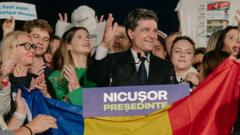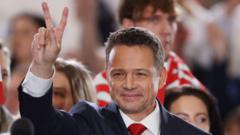Amidst the political race in Poland, candidate Karol Nawrocki's revelation of his literary pseudonym has sparked both ridicule and deep implications for his presidential ambitions.
Polish Presidential Hopeful Faces Backlash Over Literary Hoax

Polish Presidential Hopeful Faces Backlash Over Literary Hoax
Karol Nawrocki's disguise as alter ego stirs controversy ahead of elections.
Karol Nawrocki, the presidential candidate backed by Poland's right-wing Law and Justice party (PiS), has found himself at the center of a scandal after it was disclosed that he disguised himself as a fictional author to promote his own book. This revelation has generated significant mockery on social media, raising questions about his integrity and suitability for the presidency as Poland approaches a critical election.
Nawrocki's book, written under the pseudonym Tadeusz Batyr, chronicles the life of a gangster from Poland's communist era. During a 2018 television appearance, he appeared masked and claimed—it was reportedly him who inspired the author: "This historian [Karol Nawrocki] actually really inspired me, he was the first person to examine organised crime in communist Poland," he said as Batyr. In a revealing post that has surfaced online, Nawrocki previously claimed to have interacted with Batyr, indicating that he received gratitude for his guidance on the book.
This revelation has led to a storm of ridicule online, with critics pondering whether it was the fictional Tadeusz Batyr or the real Karol Nawrocki that voters would experience on the campaign trail. Despite the backlash, Nawrocki defended his actions, stating, "Literary pseudonyms are nothing new in Polish academia." He added self-praise for being the only historian daring to research organised crime in Poland, dismissing Batyr's lack of academic rigor.
Beyond the literary faux pas, Nawrocki is contending with the significant electoral backdrop of Poland's political landscape. Currently, he sits in second place behind Rafal Trzaskowski of the liberal Civic Coalition party, with rising far-right candidate Slawomir Mentzen trailing closely. With the election results likely to impact more than just domestic policies—especially given Poland's critical role in Western support for Ukraine—strategic alignment with global partners remains paramount.
Amidst international tensions, Nawrocki has blamed "the decisions of European elites" for the ongoing war in Ukraine, a comment resonating with his party's narrative that criticizes the European Union's influence. Meanwhile, political analysts highlight the stakes of the election, noting Trzaskowski's pro-European position and his potential to implement significant reforms, particularly around social issues like abortion and same-sex marriage, if elected.
With less than two months until the first round of voting, Nawrocki has increased his campaigning efforts, aiming to distance himself from the embarrassing accusations tied to his pseudonym while rallying voters around his presidency vision as Poland navigates a crucial election ahead.

















